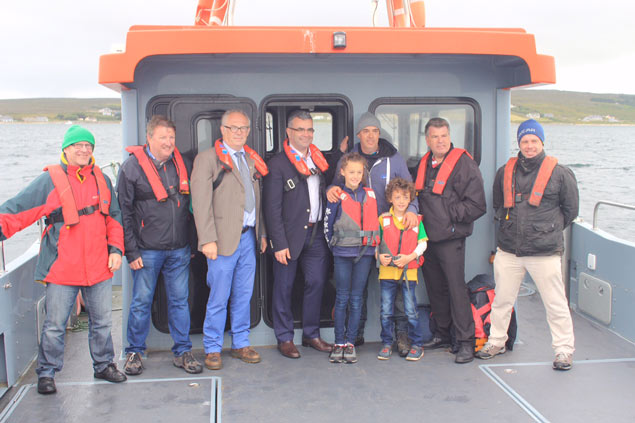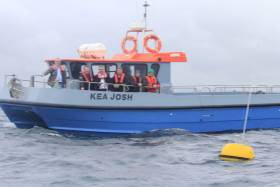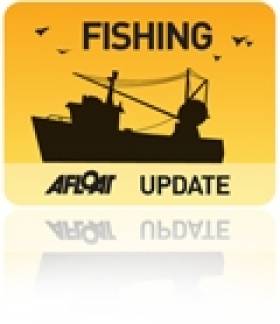Displaying items by tag: Blacksod Bay
Wave Rider Data Buoy Deployed in Blacksod Bay
The Irish Wave Energy Developers Association (IWEDA) has deployed a Wave Rider data buoy in Blacksod Bay as a first step toward establishing a Wave Energy Test site at a location near Blacksod pier on the Erris peninsula, Co Mayo.
IWEDA consists of 11 Irish wave energy companies who will use this relatively sheltered site test and enhance their devices before deploying them in more exposed sites along the Western coastline including, for example, Galway Bay.
IWEDA Chairman Conor Haughey said ' This site will be a stepping stone between tank testing and more exposed open sea sites. Valuable information will be obtained on deployments & recovery, moorings, data collection and transmission and bio fouling.
 Irish Wave Energy Developers Association (IWEDA) group that deployed the buoy in Blacksod Bay
Irish Wave Energy Developers Association (IWEDA) group that deployed the buoy in Blacksod Bay
We would like to acknowledge the help and support of County Manager, Peter Hynes, and his colleagues at Mayo County Council with this project.'
Dr Patrick Walsh of Limerick Wave acknowledged the help and support of the local fishing community in the project.
The launch of the buoy was attended by Dara Calleary TD and Michael O'Boyle of Mayo County Council. Following the launch IWEDA members headed to Inishkea Island to hold their Annual Meeting. Local IWEDA member Sean Lavelle said ' it is appropriate that a group of wave energy companies should hold their meeting on an island of the west coast surrounded by the abundant carbon free resource they wish exploit.
#scallop – The Minister for Agriculture, Food and the Marine, Simon Coveney T.D. today announced that measures to manage scallop fishing in Blacksod Bay Special Area of Conservation (SAC) had been signed into law. The measures aim to mitigate the risks, of fishing for scallop with dredges, to sensitive habitats within the Bay so as to protect and maintain these habitats.
Speaking about the Fisheries Natura Declaration for Blacksod Bay in Co. Mayo, the Minister said "Blacksod Bay contains habitats which are particularly sensitive to certain fishing activities and it is important that measures are put in place to manage the scallop fishery in this case. The quality and preservation of our marine environment is vital to the sustainability of our seafood sector and I commend the North West Regional Inshore Fisheries Forum for its work in bringing stakeholders together to address the risks posed by scallop fishing to the Blacksod Bay SAC. Stakeholder involvement is a critical success factor in developing and implementing meaningful fisheries management measures to facilitate fishing in harmony with the protection of sensitive habitats in our bays."
The Fisheries Natura Declaration gives legal effect to a risk mitigation plan prepared in partnership between the Marine Institute, the North West Regional Inshore Fisheries Forum and representatives of the fishing interests in Blacksod Bay. The measures in the Declaration include defining the footprint of the fishery to a specified zone; restricting fishing for scallops to a season from October to February inclusive and requiring fishing boats to carry GPS monitoring devices while fishing for scallop to demonstrate compliance and to contribute to data for scientific purposes. GPS monitoring devices are being funded, on a limited basis, by the Marine Institute. The Declaration and the mitigation plan will be published on www.fishingnet.ie.
The Minister re-iterated his commitment to ensuring that Irish seafood is produced in an environmentally-responsible way and stated "I have allocated almost €10 million through the Seafood Development Programme 2014-2020 to support implementation of EU environmental law, to help protect vulnerable habitats and species and ensure that our seafood sector continues to operate and grow in a sustainable manner. This investment will target a range of actions including data collection, scientific research, the use of environmentally-friendly gear and mechanisms to raise awareness of the importance of protecting the marine environment."

























































